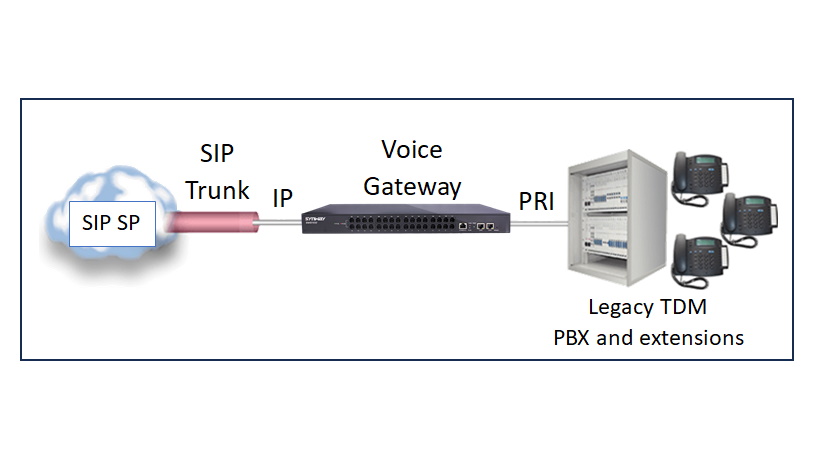When to use a voice gateway

Q-KON SA has been distributing and implementing, or helping to implement, voice gateways for nearly 25 years. Voice gateways have been instrumental in realizing significant monthly telephony bill savings for a huge number of enterprises, and are also maximizing the life span for many traditional PBX’s in an ever more SIP focused world.
Let’s start by explaining what a voice gateway is. A voice gateway is an appliance or physical device that converts analog or digital telephony signals to SIP – the protocol used for voice communication in Unified Communication platforms like Zoom, Teams, or 3CX etc..
Analog signals are used to communicate with traditional desk phones, fax machines, as well as PBX’s. Digital signals e.g. PRI (or E1) are normally used to connect a PBX to the PSTN.
When you migrate to SIP – the traditional analog or digital trunk lines from the local telephony provider are replaced with SIP trunks, thus you need to convert e.g. the analog or PRI interfaces on your PBX to SIP, so that you can connect to the SIP trunks.
Yes sure, you can replace your on-site telephony infrastructure with an all-SIP infrastructure, then you don’t need voice gateways, but such a “forklift” approach is normally much more expensive, and is definitely more disruptive to your business operation. The “forklift” approach means all telephones must be replaced with SIP phones, all telephone extension cabling must be replaced with Ethernet, and the PBX must be replaced with an IP PBX, either hosted or on-site.
With a phased approach – using the gateways to connect a PBX to the SIP trunks, the users are not affected, from the user’s perspective nothing has changed, extensions numbers remained the same, dialing patterns remained the same, and downtime is negligible. And then over time new users can be added on a SIP infrastructure.
Gateways – e.g. from vendors like SYNWAY are typically available from 2 ports to 144 analog ports, and from 1 x E1 or PRI up to 64 x E1/PRI, and are very cost effective, a 2 x E1/PRI gateway costs less than $850 once-off.
Using the larger analog gateways, hotels, hospitals, large government buildings and resorts, with their large installed base of analogue phones, are prime examples of customers can than benefit hugely by using a voice gateway to migrate to SIP, rather than to replace hundreds of phones, and many, many meters of cabling.
SYNWAY is a leading security and VoIP enabling-technology manufacturer. SYNWAY’s products have served more than 3,000 customers world-wide, including contact centers, financial institutions, public security, national safety agencies and more. SYNWAY has been in operation for nearly 30 years, are serving the market through 3 500 partners, and are active in 50 countries.
With a more efficient manner to interconnect and deliver small-to-large scalable VoIP systems, the SYNWAY E1/PRI gateways enables small and medium enterprises to maximize the value of their networks and services. Adopted by over 1,000 enterprises and service providers worldwide, these mini-sized VoIP digital gateways could secure sessions across IP and mixed network boundaries to support the seamless delivery of services.
These E1/PRI gateways features telco-grade high reliability and unparalleled cost efficiency, providing a perfect alternative for telecom operators and SPs.
In addition, the SYNWAY products are supported by a cloud-based management system, included in the cost of the units! The system is used for monitoring, maintenance and debugging of the gateways in the field. It improves controllability and manageability over the entire communication system.
Key Features:
- Optimize and balance resource utilization in large systems;
- Public cloud-, and private cloud-based deployment options are available;
- Manage device status, dialing statistics and software versions;
- Management capability for more than 10,000 devices in multiple systems;
- Superior Network Access Traversal (NAT) capability;
- Send alert and warning messages by Email, Instant messaging and SMS;